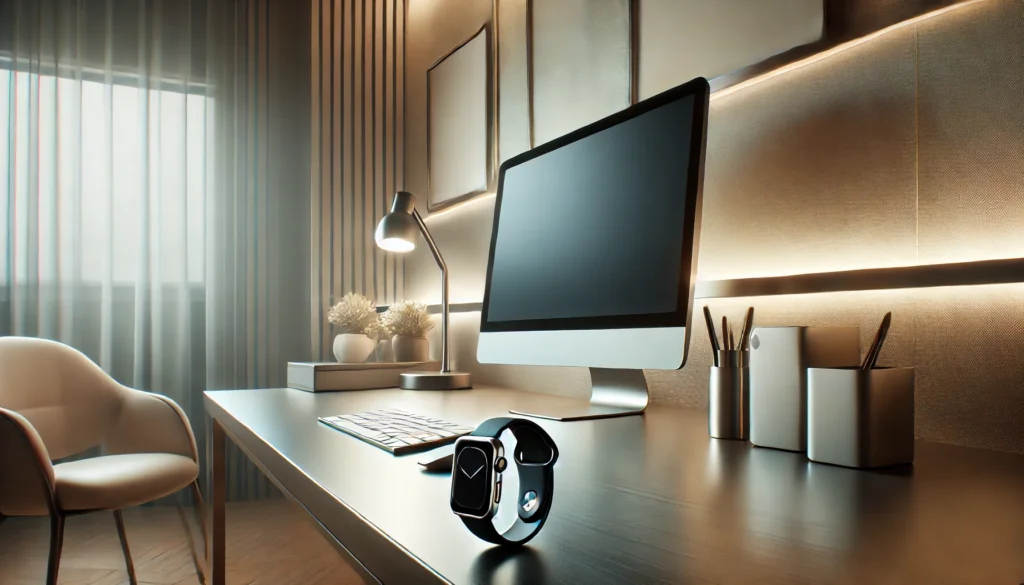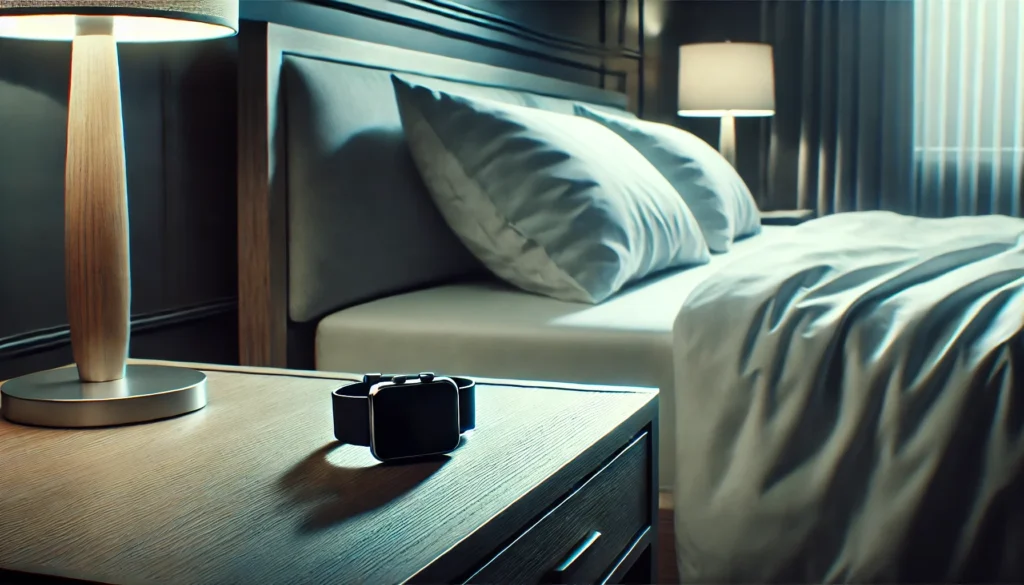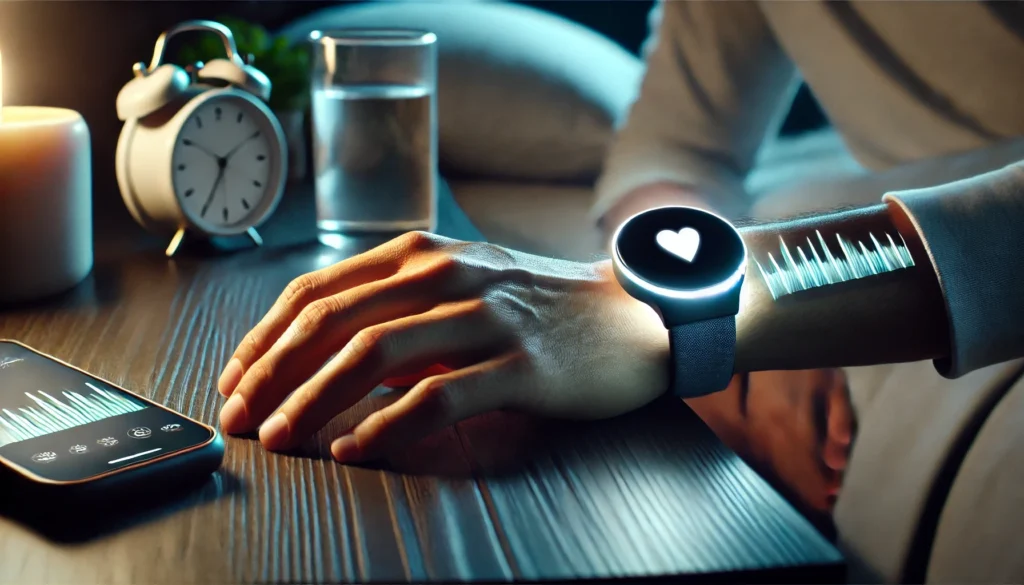In today’s fast-paced world, achieving quality sleep is more important than ever. The quest for better sleep has led many to explore various tools and technologies, with smartwatches emerging as a popular choice. These devices offer more than just time-telling capabilities; they provide insights into sleep patterns, help track health metrics, and even offer smart alarms. In this article, we delve into how smartwatches can revolutionize your sleep experience, backed by scientific insights and practical advice.
You May Also Like: Ultimate Guide to Sleep Tracker Apps
The Evolution of Sleep Tracking Technology
Sleep tracking technology has come a long way since its inception. Initially, sleep studies were confined to clinical environments, involving cumbersome equipment and laboratory settings. Today, the evolution of wearable technology has made sleep tracking accessible to everyone, right from the comfort of their own bed.
From Lab to Wrist: The Journey of Sleep Tracking
The transition from lab-based studies to wearable devices marked a revolutionary shift in sleep science. Initially, sleep studies involved polysomnography, a complex process requiring patients to sleep in a clinical setting with numerous wires attached to their bodies. This method, while accurate, was not conducive to natural sleep patterns due to the unfamiliar environment and intrusive equipment. The development of wearables has transformed this landscape, allowing individuals to track their sleep in their own beds, free from the constraints of a lab.
The Rise of Wearable Technology
Wearable technology has seen exponential growth over the past decade, with smartwatches leading the charge. These devices have become more sophisticated, incorporating sensors that can monitor a range of biometric data. The ability to track heart rate, movement, and even blood oxygen levels has transformed the way we understand sleep. By collecting data continuously throughout the night, these devices provide a clearer picture of sleep cycles and quality.
Advanced Sensors and Algorithms
Modern smartwatches are equipped with advanced sensors and algorithms that enhance the accuracy of sleep tracking. Accelerometers detect movement, while photoplethysmography (PPG) sensors measure heart rate and blood flow. Some devices even incorporate electrodermal activity sensors to assess stress levels. The integration of these sensors with sophisticated algorithms allows for a detailed analysis of sleep stages, offering insights into REM, light, and deep sleep cycles.

Why Sleep Matters
Before diving into the specifics of sleep tracking, it’s crucial to understand why sleep is so vital. Sleep is not just a passive state of rest but an active process that supports brain function, physical health, and overall well-being. Lack of quality sleep can lead to a myriad of health issues, including cognitive impairments, weakened immunity, and increased risk of chronic conditions.
Cognitive and Emotional Health
Quality sleep is essential for maintaining cognitive function and emotional stability. During sleep, the brain processes information from the day, consolidating memories and enhancing learning. A lack of sleep can impair cognitive processes such as attention, problem-solving, and decision-making. Furthermore, sleep deprivation is closely linked to mood disorders such as anxiety and depression, underscoring the importance of a good night’s rest for mental health.
Physical Health and Immunity
Sleep plays a crucial role in physical health by supporting various physiological processes. It aids in muscle recovery, tissue growth, and repair, making it vital for athletes and those engaging in physical activities. Additionally, sleep is integral to immune function, helping the body fight off infections and diseases. Chronic sleep deprivation can weaken the immune system, making individuals more susceptible to illnesses and prolonging recovery times.
Long-term Health Implications
Consistently poor sleep quality can have significant long-term health implications. Research has linked insufficient sleep to an increased risk of chronic conditions such as obesity, diabetes, cardiovascular disease, and stroke. Sleep deprivation can also lead to metabolic imbalances, such as altered glucose metabolism and increased appetite, which contribute to weight gain and related health issues. Prioritizing sleep is, therefore, an essential component of a healthy lifestyle.
The Role of Smartwatches in Sleep Enhancement
Smartwatches serve as an accessible tool for anyone looking to improve their sleep quality. They offer several features that make them indispensable for sleep tracking:
Comprehensive Sleep Analysis
Smartwatches analyze sleep cycles by monitoring movement and physiological signals. They provide detailed reports that help users identify patterns and disruptions in their sleep. This data allows individuals to pinpoint factors that may be affecting their sleep, such as stress, diet, or environmental conditions. By understanding these patterns, users can make informed changes to their routines to enhance sleep quality.
Smart Alarms and Sleep Timing
Unlike traditional alarms, smart alarms wake users during their light sleep phase, reducing grogginess and making waking up a more pleasant experience. This feature is based on the science of sleep cycles, which suggests that waking during lighter sleep stages can minimize sleep inertia. By timing alarms to coincide with these stages, smartwatches help users start their day feeling more refreshed and alert.
Heart Rate Variability (HRV) Monitoring
HRV is a critical indicator of sleep quality and recovery. Tracking HRV can give insights into stress levels and overall cardiovascular health. Smartwatches use HRV data to assess how well the body is recovering overnight, providing a valuable metric for evaluating sleep quality. A higher HRV is generally associated with better cardiovascular fitness and resilience to stress, making it an important factor in overall health.
Customizable Insights and Recommendations
Many smartwatches offer personalized insights and recommendations to help users improve their sleep hygiene and routines. These devices analyze sleep data to provide tailored advice, such as ideal bedtime and wake-up time, optimal sleep duration, and tips for improving sleep environment. By offering actionable recommendations, smartwatches empower users to take control of their sleep habits and make positive changes for better rest.

Best Smartwatches and Fitness Trackers for Sleep in 2024
When it comes to choosing the best device for sleep tracking, several options stand out in the market. Here are some of the top contenders:
Fitbit Versa 3
Fitbit has long been a leader in the wearable technology space, and the Versa 3 is no exception. It offers advanced sleep tracking capabilities, including sleep stages, HRV, and a smart alarm feature. The device’s intuitive interface and comprehensive health metrics make it a favorite among users.
Sleep Stages and Detailed Analysis
The Fitbit Versa 3 provides in-depth analysis of sleep stages, breaking down the time spent in REM, light, and deep sleep. This feature helps users understand their sleep patterns and identify potential disruptions, such as frequent awakenings or insufficient deep sleep.
Smart Alarm and Sleep Score
The smart alarm feature ensures users wake up feeling refreshed by timing alarms to coincide with light sleep stages. Additionally, the Versa 3 offers a sleep score that summarizes sleep quality into a single metric, making it easy to track improvements over time.
Health and Fitness Integration
Beyond sleep tracking, the Fitbit Versa 3 integrates seamlessly with other health and fitness features, such as heart rate monitoring, activity tracking, and guided breathing exercises. This holistic approach provides users with a comprehensive view of their overall health.
Garmin Vivosmart 4
The Garmin Vivosmart 4 is an excellent choice for those seeking a balance between functionality and affordability. It includes a pulse oximeter to measure blood oxygen levels and a Body Battery energy monitor that helps users understand how their sleep impacts their energy levels throughout the day.
Pulse Oximeter for Oxygen Monitoring
The inclusion of a pulse oximeter allows the Vivosmart 4 to measure blood oxygen saturation levels during sleep. This feature can be particularly useful for identifying potential sleep disorders, such as sleep apnea, which often goes undiagnosed.
Body Battery and Energy Levels
The Body Battery feature assesses the user’s energy levels throughout the day by analyzing sleep data and other health metrics. This insight helps users understand how sleep quality affects daily energy and productivity, encouraging better sleep habits.
Stress and Relaxation Tracking
In addition to sleep tracking, the Vivosmart 4 monitors stress levels and provides relaxation exercises to help users manage stress. This comprehensive approach supports overall well-being by promoting both physical and mental health.
Oura Ring
Though not a smartwatch, the Oura Ring deserves mention for its exceptional sleep tracking capabilities. It provides in-depth insights into sleep stages, readiness scores, and HRV, making it a popular choice among biohackers and health enthusiasts.
Sleep Stages and Readiness Scores
The Oura Ring offers detailed analysis of sleep stages, helping users understand the quality of their rest. Its readiness score assesses overall recovery, providing guidance on whether to prioritize rest or activity each day.
HRV and Temperature Monitoring
With HRV monitoring, the Oura Ring offers insights into cardiovascular health and recovery. The device also tracks body temperature, which can indicate changes in sleep patterns or potential health issues.
Minimalist Design and Comfort
Designed for comfort and discretion, the Oura Ring provides powerful sleep tracking capabilities without the bulk of a traditional smartwatch. Its minimalist design makes it an attractive option for those seeking unobtrusive sleep monitoring.
Apple Watch Series 8
The Apple Watch Series 8 combines style and functionality with its comprehensive health tracking features. Its sleep app provides detailed analyses, and the device integrates seamlessly with other health apps to offer personalized sleep coaching.
Sleep App and Health Integration
The Apple Watch’s dedicated sleep app offers detailed insights into sleep patterns, including duration and quality. Its integration with other health apps allows users to create a personalized sleep plan, incorporating factors like activity levels and stress management.
Stylish Design and User Experience
Known for its sleek design and user-friendly interface, the Apple Watch Series 8 provides an enjoyable user experience. Its stylish appearance makes it suitable for both casual and professional settings, ensuring users can monitor their health discreetly.
Ecosystem and Connectivity
As part of the Apple ecosystem, the Watch Series 8 offers seamless connectivity with other Apple devices. This integration allows users to access and manage their sleep data across multiple platforms, enhancing the overall user experience.
Practical Tips for Using Smartwatches to Enhance Sleep
While smartwatches offer valuable insights, optimizing their use can further enhance sleep quality:
Consistency is Key
Wear your smartwatch consistently to gather accurate data over time. This will help identify trends and areas for improvement. Consistent usage ensures that the device collects comprehensive data, providing a more accurate picture of sleep patterns and quality.
Review and Adjust
Regularly review the insights provided by your device and adjust your sleep habits accordingly. This might include altering your bedtime routine or adjusting your sleep environment. By making informed changes based on the data, users can optimize their sleep for better health and well-being.
Integrate with Health Apps
Many smartwatches can sync with health apps to provide a holistic view of your health. Use these integrations to correlate sleep data with other health metrics for a comprehensive understanding. This approach allows users to see how sleep affects other aspects of health, such as activity levels and stress.
Listen to Your Body
While data is invaluable, it’s essential to listen to your body and make changes that feel right for you. Personal comfort and preference should always take precedence. Trusting your instincts and paying attention to how you feel can lead to more sustainable and effective sleep improvements.

The Future of Sleep Tracking
The future of sleep tracking looks promising, with advancements in artificial intelligence and machine learning poised to offer even more personalized insights and recommendations. As technology continues to evolve, we can expect smarter algorithms, more accurate sensors, and seamless integration with other health monitoring devices.
AI and Machine Learning in Sleep Tracking
The integration of AI and machine learning into sleep tracking is set to revolutionize the field. These technologies can analyze vast amounts of data to identify patterns and predict sleep needs. As a result, users can expect more accurate and personalized recommendations for improving sleep quality.
Improved Sensor Technology
Advancements in sensor technology promise to enhance the accuracy and range of data collected by smartwatches. Future devices may incorporate additional sensors, such as EEG for brain activity monitoring, providing even more comprehensive insights into sleep health.
Seamless Health Integration
The future will likely see greater integration between sleep tracking devices and other health monitoring systems. This seamless integration will enable users to manage all aspects of their health from a single platform, making it easier to understand the interplay between sleep and overall wellness.
In conclusion, smartwatches represent a significant leap forward in our understanding of sleep and its impact on health. By providing detailed insights and actionable data, these devices empower users to take control of their sleep quality, leading to improved health and well-being. Whether you’re a health coach, science journalist, or biohacker, integrating a smartwatch into your routine can offer a wealth of information and insights to help optimize your sleep and overall wellness.
Further Reading:
Wearables and sleep: What can they really tell us?
Best Sleep Trackers of 2025: Data That Matters
Is Your Smartwatch as Good as an At-Home Sleep Test?
Important Note: The information contained in this article is for general informational purposes only, and should not be construed as health or medical advice, nor is it intended to diagnose, prevent, treat, or cure any disease or health condition. Before embarking on any diet, fitness regimen, or program of nutritional supplementation, it is advisable to consult your healthcare professional in order to determine its safety and probable efficacy in terms of your individual state of health.
Regarding Nutritional Supplements Or Other Non-Prescription Health Products: If any nutritional supplements or other non-prescription health products are mentioned in the foregoing article, any claims or statements made about them have not been evaluated by the U.S. Food and Drug Administration, and such nutritional supplements or other health products are not intended to diagnose, treat, cure, or prevent any disease.


